研究生英语综合教程
- 格式:ppt
- 大小:3.36 MB
- 文档页数:18
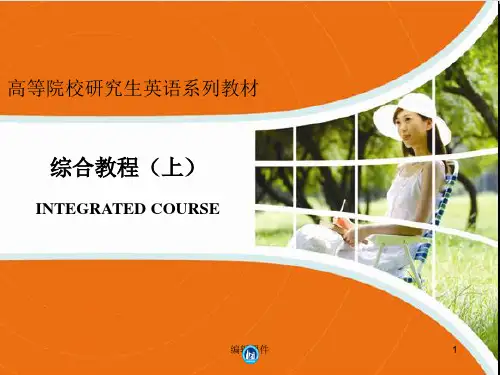
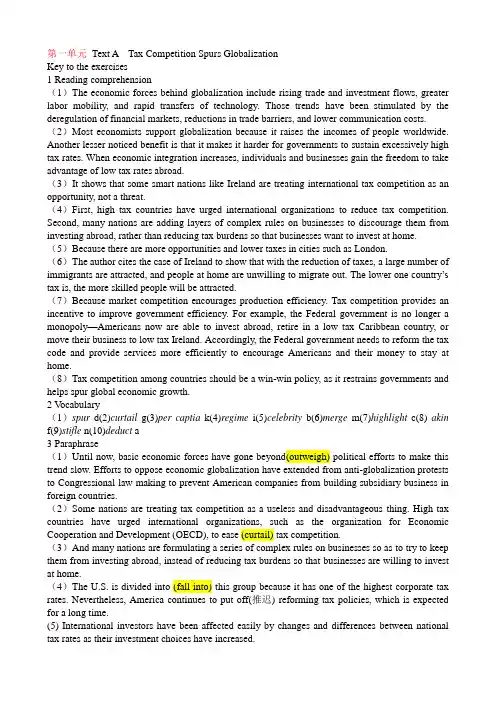
第一单元Text A Tax Competition Spurs GlobalizationKey to the exercises1 Reading comprehension(1)The economic forces behind globalization include rising trade and investment flows, greater labor mobility, and rapid transfers of technology. Those trends have been stimulated by the deregulation of financial markets, reductions in trade barriers, and lower communication costs. (2)Most economists support globalization because it raises the incomes of people worldwide. Another lesser noticed benefit is that it makes it harder for governments to sustain excessively high tax rates. When economic integration increases, individuals and businesses gain the freedom to take advantage of low tax rates abroad.(3)It shows that some smart nations like Ireland are treating international tax competition as an opportunity, not a threat.(4)First, high tax countries have urged international organizations to reduce tax competition. Second, many nations are adding layers of complex rules on businesses to discourage them from investing abroad, rather than reducing tax burdens so that businesses want to invest at home.(5)Because there are more opportunities and lower taxes in cities such as London.(6)The author cites the case of Ireland to show that with the reduction of taxes, a large number of immigrants are attracted, and people at home are unwilling to migrate out. The lower one country’s tax is, the more skilled people will be attracted.(7)Because market competition encourages production efficiency. Tax competition provides an incentive to improve government efficiency. For example, the Federal government is no longer a monopoly—Americans now are able to invest abroad, retire in a low tax Caribbean country, or move their business to low tax Ireland. Accordingly, the Federal government needs to reform the tax code and provide services more efficiently to encourage Americans and their money to stay at home.(8)Tax competition among countries should be a win-win policy, as it restrains governments and helps spur global economic growth.2 V ocabulary(1)spur d(2)curtail g(3)per captia k(4)regime i(5)celebrity b(6)merge m(7)highlight c(8) akin f(9)stifle n(10)deduct a3 Paraphrase(1)Until now, basic economic forces have gone beyond(outweigh) political efforts to make this trend slow. Efforts to oppose economic globalization have extended from anti-globalization protests to Congressional law making to prevent American companies from building subsidiary business in foreign countries.(2)Some nations are treating tax competition as a useless and disadvantageous thing. High tax countries have urged international organizations, such as the organization for Economic Cooperation and Development (OECD), to ease (curtail) tax competition.(3)And many nations are formulating a series of complex rules on businesses so as to try to keep them from investing abroad, instead of reducing tax burdens so that businesses are willing to invest at home.(4)The U.S. is divided into (fall into) this group because it has one of the highest corporate tax rates. Nevertheless, America continues to put off(推迟) reforming tax policies, which is expected for a long time.(5) International investors have been affected easily by changes and differences between national tax rates as their investment choices have increased.(6)Another noticeable issue is that many businesses used to invest in foreign country only want to take the opportunity for fixed resources, such as oil deposits. Today, many industries-such as finance and services-are free to invest and can set up new firms anywhere(footloose).(7)For example, in recent years Canadian policymakers have to consider important issue that a group of skilled and talented people from technology industries in Canada have emigrate to its lower tax southern neighbor, the U.S.(8)For many years, young Irish people went to America and other foreign countries, and tried to find a way to live a better life. But after Ireland reduced individual tax and then quickly cut corporate tax, the pattern of out migration was changed around completely in this country.(9)To keep the skilled labor from leaving their own country to other countries, governments had to direct spending and tax levels to satisfy local residents. In which country Individuals chose to resident according to their demand for public goods relative to local tax levels.(10)If the U.S. makes progress in tax reform, other nations would probably reform their taxes in the same way(follow suit), as they did when the U.S. reduced rates in the 1980s.4 Cloze(1)and(2) understand(3) about(4) sides(5) what(6) bad(7) nor(8) properly(9)destroy(10) says(11) which(12) stronger(13) behind(14) up(15) While(16) unique(17)dark(18) benefits(19) from(20) rule5 TranslationA Translate the following paragraphs into Chinese.由于殖民地与许多海外地区的大量贸易,所有欧洲重要商业国以及它们在西半球领地的金银铸币在北美东海岸都可以自由交换。
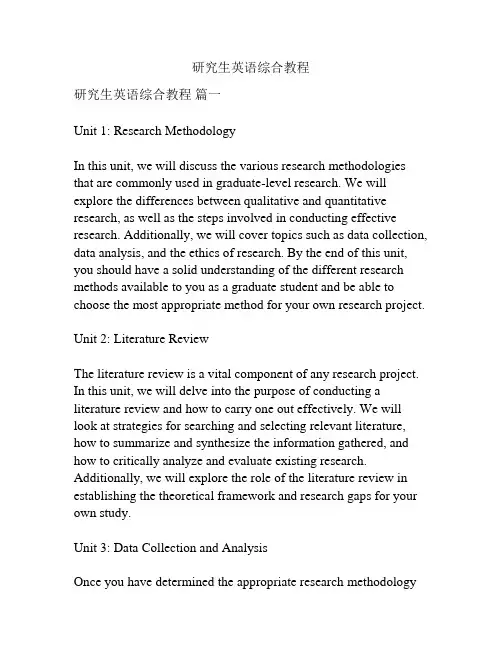
研究生英语综合教程研究生英语综合教程篇一Unit 1: Research MethodologyIn this unit, we will discuss the various research methodologies that are commonly used in graduate-level research. We will explore the differences between qualitative and quantitative research, as well as the steps involved in conducting effective research. Additionally, we will cover topics such as data collection, data analysis, and the ethics of research. By the end of this unit, you should have a solid understanding of the different research methods available to you as a graduate student and be able to choose the most appropriate method for your own research project.Unit 2: Literature ReviewThe literature review is a vital component of any research project. In this unit, we will delve into the purpose of conducting a literature review and how to carry one out effectively. We will look at strategies for searching and selecting relevant literature, how to summarize and synthesize the information gathered, and how to critically analyze and evaluate existing research. Additionally, we will explore the role of the literature review in establishing the theoretical framework and research gaps for your own study.Unit 3: Data Collection and AnalysisOnce you have determined the appropriate research methodologyand conducted a literature review, it is time to collect and analyze data. In this unit, we will examine different data collection methods, including surveys, interviews, observations, and experiments. We will also discuss strategies for ensuring data validity and reliability. Furthermore, we will explore various data analysis techniques, such as descriptive statistics, inferential statistics, and qualitative data analysis. By the end of this unit, you should feel confident in your ability to collect and analyze data for your own research.Unit 4: Writing and Presenting ResearchThe final unit of this course will focus on the essential skills of writing and presenting research. We will discuss the structure and organization of a research paper, as well as the importance of clear and concise writing. We will also explore strategies for presenting research findings effectively through oral presentations and poster presentations. Lastly, we will touch on the publication process and provide tips for getting your research published. By the end of this unit, you should be well-equipped to write and present your own research in a professional and impactful manner.Please note that the above units are just a sample outline for a comprehensive graduate-level English course. The actual content and topics covered may vary depending on the specific curriculum and requirements of your program.。
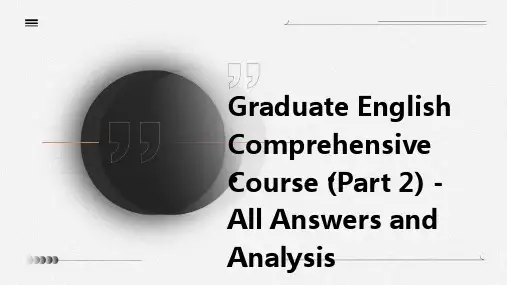
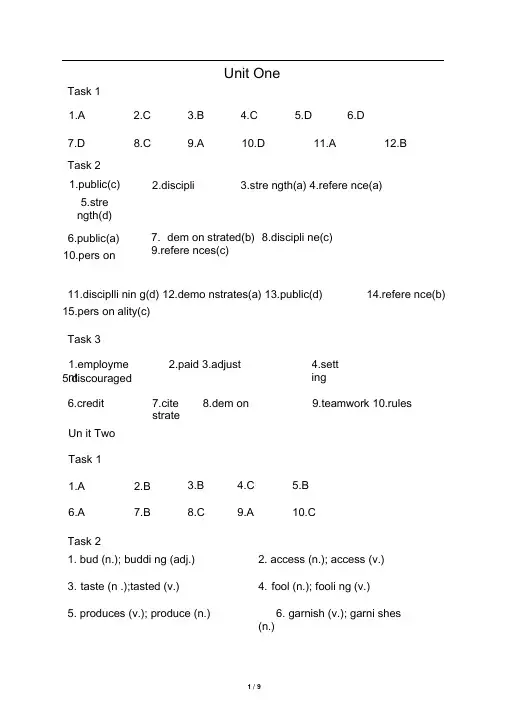
Task 1Task 21.public(c)5.strength(d)7. dem on strated(b) 8.discipli ne(c)9.refere nces(c)11.disciplli nin g(d) 12.demo nstrates(a) 13.public(d) 15.pers on ality(c)Task 35.discouraged1. bud (n.); buddi ng (adj.) 3. taste (n .);tasted (v.)5. produces (v.); produce (n.)2. access (n.); access (v.)4. fool (n.); fooli ng (v.)6. garnish (v.); garni shes(n.)Unit One1.employme nt2.paid3.adjust4.setting7.cite 8.dem onstrate9.teamwork 10.rulesUn it Two Task 11.A2.B 6.A 7.B 6.creditTask 2 3.B 4.C 5.B 8.C 9.A 10.C1.A2.C3.B4.C5.D6.D7.D 8.C 9.A 10.D 11.A 12.B2.discipline(b)3.stre ngth(a)4.refere nce(a)6.public(a)10.pers onality(a)14.refere nce(b)8. concern (n.); concerned (v.)10. practiced (v.); practice (n.)Task 3Un it ThreeTask 1Task 2Task 31) swirli ng 2) delivered 3) glowed 4) in tervals 5) conv erge6) wan deri ngs absorbedUnit FourTask 1 7) n avigate 8) jealousy 9) presenee 10)7. reig ns (v.); reig n (n.)9. n amed (v.); n ame (n.)1) in tegration steam ing2) choice 3) han ded 4) aspiri ng 5)6) masterpiecesprese nted7) pleasure 8) partake 9) amaz ing 10)1.A2.B3.C4.B5.A6.B7.C8.A1. stack up against off2. struck a chord3. amoun ted to4. chopp ing5. appeal to6. pick up on7. tur ned out8. fade away9. brought togetherclear of10. pulled off 11. thrust upon 12. be kept1.A2. A3. C4. B5. B6. C7. D8. C9. A 10. CTask 21. mai ntai ned (a)esse ntials (c)2. roma ntic (a)3. esse ntial (a)4.5. dime nsion (c) defies (b)6. i ntimate (a)7. mai ntai ns (c)8.9. i ntimated (d) roma ntic (b) 10. dime nsions (a) 11. defy (a)12.13. dime nsions (b) 14. main tai n (d) 15. i ntimate (c)Task 31) prerequisiteimporta nt2) date 3) Respect 4)5) whomever essential6) can didates 7) highly 8)9) suitable 10) sufficie ntUnit FiveTask 11. B2. D3. C4.13. BB 5.C 6. A 7. B 8.D 9. C 10. A 11.C 12. DTask 21. A. masterpieces B. mastered C. mastery3. A. executi ng B. executio n C. executive4. A. prese ntati on B. represe ntedC. prese ntedD.prese nt5. A. inven torsB. inv estorsC. inno vator6. A. breath B. b reathi ngC. breathtak ingD.breathless7. A. physical B. p hysiological C. psychological8. A. discipli ne B. r out ine C. discipli ne9. A. practiceB. p erformedC. perfectD. proper10. A. reactionB. recon ciliati onC. resista neeD.responseTask 21. conten ted2. conven ti on3. tall 5. Conven ti onTask 3 I) writte n 5) soul6) described 10) exercisesII) con trol 15) medicalUn it Six Task 1 1.B2. D2) practiced7) mental 12) experie nces3.A4. C5. B3) adapted4) fun dame ntal 8) state of being13) in cludi ng 6. A 7. C 8. D9) pictured14) in dividuals9. B 10. C4. curiously6. content10. cou nt11. content 15. tallTask 31)sheer5) chaotic6) sophisticated 10) safestUn it Seve nTask 11.A2. CTask 2 Step 1partiallyemployeeproverbialalterati on Step27. execute 8. curious 9. execute 12. conven tions2) subject7) violenee3. B4. B5. C13. count14. conven tion3) contradictory8) glamorous6. A7. B8. C4) worldly9) crime9. A 10. Cun fold un selfish ness/selfish ness imperfectrefin eme nt in destructible liar con siderablecrim inal mistake traitor phila nthropist1. in destructible2. mistook3. un selfish ness alteration6. traitor7. con siderable8. liar 4. imperfect 5.9. employees 10. un folds11. refin eme nt proverbial 12. phila nthropist 13. criminal14. partially 15.1. So far as rm concerned2. should en deavor to measure whether predeterm ined goals are being achieved3. has bee n en grossed in conv ersati on with all ni ght4. draw con clusi ons from the results of a si ngle survey5. He had no friends nor acqua intan ces6. did she tell him about the attack7. as we had see n8. that he had had a family himself9. the problems you men ti on are in here nt in the system10. young people con scie ntious in their work/y oung people who are con scie ntious in their work11. deviated from her custom12. at the peril of your own life/at your own peril13. take n on a new dime nsion14. capable of look ing after myself15. in much the same way as it was 200 years ago16. rescue the sailors from the sinking ship17. participated in the war18. due to our ignoranceUn it Eight1. A. black and white B. i n black and whiteC.black-a nd-white2. A. on the sce ne B. sets the sce neC. behi nd thescenes3. A. make no differe nee B. make a differe neeC. make any differe neeD. make all the differe nee4. A. work on B. works aga inst C. work out5. A. spread to B. spreadi ng outC. spreadthroughTask 31.A2.B3.B4.D5.AStep 1 1. boot---e, m 3. fatal--b, q 5. n et---a, f, 1 7. reward--k, o Step 2 1. boot (m)2. vacum (p)⑴6. n egotiati ng (n)7. odds (h) n egotiati ons (g)Task 22. boun d--c, j 4. n egotiate--g, n 6. the odds--h, i 8. vacuum---d, p3. rewarded (o)4. reward (k)5. net8. odds (i) 9. Fatal (b) 10.6.B7.C8.B9.D 10.CUn it Ni ne Task 1 1.A2. DTask 2 I. crammed (b)crashed (a)6. crammed (d)10. slumped (b)II. trust (c)15. liberals (b)16. trust (b) Task 3 1)A2) DDUnit Ten Task 1 I.A 2. C 3. D Task 2 1. un derly ingvuln erable 6. diffused eloque nee3. B4. B5. C6. A7. B8. A 2. balloon (a)7. ballo oned(c)12. trust (d)3) B 4) B 4. B 5. B2. im mune7. foremostTask 33. crash (a)8. crash (b)13. liberal (c)5) C 6) C 7) A 6. B 7. C 8. D3. impart8. scholarly9. C 10. A4. crammed (a)9. balloo n (b)14. slump (c)8) A 9) D 9. A 10. B4. imperative9. illuminated5.10)5.10.1)deeper 2) con tribute 3) explore 4) pote ntial 5) how6) productive 7) likely 8) produce 9) Natio nally 10) dedicated。
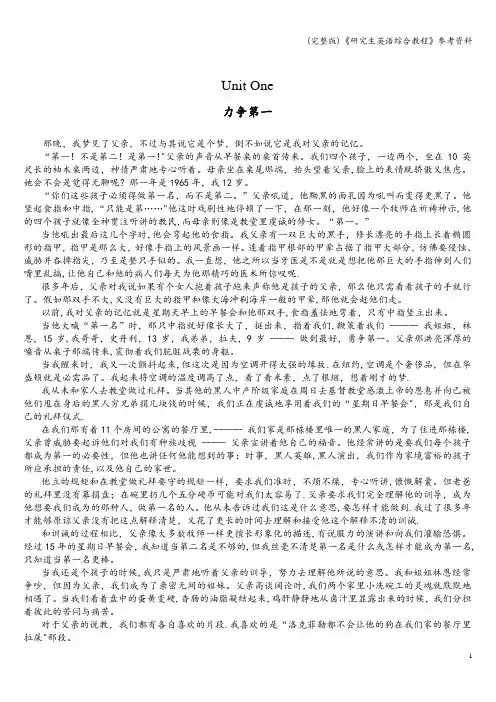
Unit One力争第一那晚,我梦见了父亲,不过与其说它是个梦,倒不如说它是我对父亲的记忆。
“第一!不是第二!是第一!"父亲的声音从早餐桌的桌首传来。
我们四个孩子,一边两个,坐在10英尺长的柚木桌两边,神情严肃地专心听着。
母亲坐在桌尾那端,抬头望着父亲,脸上的表情既骄傲又焦虑。
她会不会是觉得无聊呢?那一年是1965年,我12岁。
“你们这些孩子必须得做第一名,而不是第二。
”父亲吼道,他黝黑的面孔因为吼叫而变得更黑了。
他竖起食指和中指,“只能是第……"他这时戏剧性地停顿了一下,在那一刻,他好像一个牧师在祈祷神示,他的四个孩子就像全神贯注听讲的教民,而母亲则像是教堂里虔诚的修女。
“第一。
”当他吼出最后这几个字时,他会弯起他的食指。
我父亲有一双巨大的黑手,修长漂亮的手指上长着椭圆形的指甲,指甲是那么大,好像手指上的风景画一样。
连着指甲根部的甲晕占据了指甲大部分,仿佛要侵蚀、威胁并吞掉指尖,乃至是整只手似的。
我一直想,他之所以当牙医是不是就是想把他那巨大的手指伸到人们嘴里乱搞,让他自己和他的病人们每天为他那精巧的医术所惊叹呢.很多年后,父亲对我说如果有个女人抱着孩子跑来声称他是孩子的父亲,那么他只需看看孩子的手就行了。
假如那双手不大,又没有巨大的指甲和像大海冲刷海岸一般的甲晕,那他就会赶他们走。
以前,我对父亲的记忆就是星期天早上的早餐会和他那双手,食指羞怯地弯着,只有中指竖立出来。
当他大喊“第一名”时,那只中指就好像长大了,挺出来,指着我们,鞭策着我们 -—-—我姐姐,林恩,15岁,我哥哥,史丹利,13岁,我弟弟,拉夫,9岁 -—-- 做到最好,勇争第一。
父亲那洪亮浑厚的嗓音从桌子那端传来,震彻着我们肮脏战栗的身躯。
当我醒来时,我又一次颤抖起来,但这次是因为空调开得太强的缘故.在纽约,空调是个奢侈品,但在华盛顿就是必需品了。
我起来将空调的温度调高了点,看了看米素,点了根烟,想着刚才的梦.我从未和家人去教堂做过礼拜。
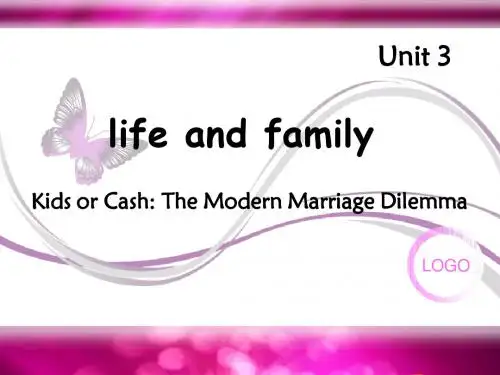
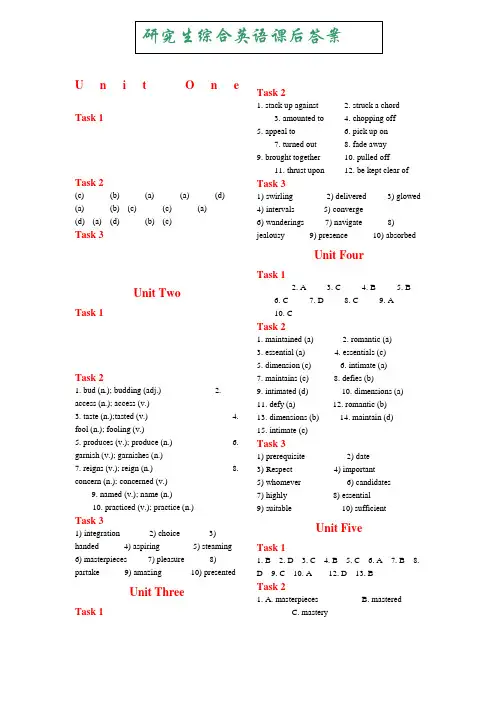
U n i t O n e Task 1Task 2(c) (b) (a) (a) (d) (a) (b) (c) (c) (a)(d) (a) (d) (b) (c)Task 3Unit TwoTask 1Task 21. bud (n.); budding (adj.)2. access (n.); access (v.)3. taste (n.);tasted (v.)4. fool (n.); fooling (v.)5. produces (v.); produce (n.)6. garnish (v.); garnishes (n.)7. reigns (v.); reign (n.) 8. concern (n.); concerned (v.)9. named (v.); name (n.)10. practiced (v.); practice (n.)Task 31) integration 2) choice 3) handed 4) aspiring 5) steaming 6) masterpieces 7) pleasure 8) partake 9) amazing 10) presentedUnit ThreeTask 1 Task 21. stack up against2. struck a chord3. amounted to4. chopping off5. appeal to6. pick up on7. turned out 8. fade away9. brought together 10. pulled off11. thrust upon 12. be kept clear of Task 31) swirling 2) delivered 3) glowed 4) intervals 5) converge6) wanderings 7) navigate 8) jealousy 9) presence 10) absorbedUnit FourTask 12. A3. C4. B5. B6. C7. D8. C9. A10. CTask 21. maintained (a)2. romantic (a)3. essential (a)4. essentials (c)5. dimension (c)6. intimate (a)7. maintains (c) 8. defies (b)9. intimated (d) 10. dimensions (a) 11. defy (a) 12. romantic (b)13. dimensions (b) 14. maintain (d)15. intimate (c)Task 31) prerequisite 2) date3) Respect 4) important5) whomever 6) candidates7) highly 8) essential9) suitable 10) sufficientUnit FiveTask 11. B2. D3. C4. B5. C6. A7. B8.D 9. C 10. A 12. D 13. BTask 21. A. masterpieces B. masteredC. mastery2. A. committed B. commissionC. commitment3. A. executing B. executionC. executive4. A. presentation B. representedC. presentedD. present5. A. inventors B. investorsC. innovator6. A. breath B. breathingC. breathtakingD. breathless7. A. physical B. physiologicalC. psychological8. A. discipline B. routineC. discipline9. A. practice B. performedC. perfectD. proper10. A. reaction B. reconciliationC. resistanceD. response Task 31) written 2) practiced 3) adapted 4) fundamental 5) soul 6) described 7) mental 8) state of being 9) pictured 10) exercises 11) control 12) experiences 13) including 14) individuals 15) medicalUnit SixTask 12. D 4. C 5. B 6. A 7. C 8.D 9. B 10. CTask 21. contented2. convention3. tall4. curiously5. Convention6. content7. execute8. curious9. execute 10. count 11. content 12. conventions 13. count 14. convention 15. tall Task 31) sheer 2) subject 3) contradictory 4) worldly 5) chaotic 6) sophisticated 7) violence 8) glamorous 9) crime 10) safestUnit Seven Task 12. C3. B4. B5. C6. A7. B8. C9. A 10. CTask 2Step 1partially unfoldunselfishness/selfishnessimperfect employee proverbial r efinement indestructiblecriminal mistake alteration liar considerabletraitorphilanthropistStep 21. indestructible2. mistook3. unselfishness4. imperfect5. alteration6. traitor7. considerable8. liar9. employees 10. unfolds11. refinement 12. philanthropist 13. criminal 14. partially 15. proverbialTask 31. So far as I'm concerned2. should endeavor to measure whether predetermined goals are being achieved3. has been engrossed in conversation with all night4. draw conclusions from the results of a single survey5. He had no friends nor acquaintances6. did she tell him about the attack7. as we had seen8. that he had had a family himself9. the problems you mention are inherent in the system10. young people conscientious in theirwork/young people who are conscientious in their work11. deviated from her custom12. at the peril of your own life/at your own peril13. taken on a new dimension14. capable of looking after myself15. in much the same way as it was 200 years ago16. rescue the sailors from the sinking ship17. Portugal participated in the war18. due to our ignoranceUnit EightTask 1Step 11. boot---e, m2. bound--c, j3. fatal--b, q4. negotiate--g, n5. net---a, f, 16. the odds--h, i7. reward--k, o 8. vacuum---d, pStep 21. boot (m)2. vacum (p)3. rewarded (o)4. reward (k)5. net (f)6. negotiating (n)7. odds (h)8. odds (i)9. Fatal (b) 10. negotiations (g)Task 21. A. black and white B. in black and white C. black-and-white2. A. on the scene B. sets the sceneC. behind the scenes3. A. make no difference B. make a differenceC. make any differenceD. make all the difference4. A. work on B. works againstC. work out5. A. spread to B. spreading outC. spread throughTask 3Unit NineTask 12. D3. B4. B5. C6. A7. B8. A9. C 10. ATask 2 1. crammed (b) 2. balloon (a) 3. crash (a) 4. crammed (a) 5. crashed (a) 6. crammed (d) 7. ballooned (c) 8. crash (b) 9. balloon (b) 10. slumped(b)11. trust (c) 12. trust (d) 13. liberal (c) 14. slump (c) 15. liberals (b) 16. trust (b)Task 31)A 2) D 3) B 4) B 5) C6) C 7) A 8) A 9) D10) DUnit TenTask 12. C3. D4. B5. B6. B7. C8. D9. A 10. BTask 21. underlying2. immune3. impart4. imperative5. vulnerable6. diffused7. foremost8. scholarly9. illuminated 10. eloquence Task 31) deeper 2) contribute 3) explore 4) potential 5) how6) productive 7) likely 8) produce 9) Nationally 10) dedicated。

1. Recently, one of us had the opportunity to speak with a medical student about a research rotation that the student was planning to do. She would be working with Dr. Z, who had given her the project of writing a paper for which he had designed the protocol, collected the data, and compiled the results. The student was to do a literature search and write the first draft of the manuscript. For this she would become first author on the final publication. When concerns were raised about the proposed project, Dr. Z was shocked. "l thought I was doing her a favor," he said innocently, "and besides, I hate writing!"2. Dr. Z is perhaps a bit naive. Certainly, most researchers would know that the student's work would not merit first authorship. They would know that "gift" authorship is not an acceptable research practice. However, an earlier experience in our work makes us wonder. Several years ago, in conjunction with the grant from the Fund for the Improvement of Pott Secondary Education (FIPSE), a team of philosophers and scientists at Dartmouth College 2 ran a University Seminar series for faculty on the topic "Ethical Issues in scientific Research."At one seminar, a senior researcher (let's call him Professor R) argued a similar position to that of Dr. Z. In this case Professor R knew that "gift" authorship, authorship without a significant research contribution, was an unacceptable research practice. However, he had a reason to give authorship to his student.The student had worked for several years on a project suggested by him and the project had yielded to publishable data. Believing that he had a duty to the student to ensure a publication, Professor R had given the student some data that he himself had collected and told the student to write it up. The student had worked hard, he said, albeit on another project, and the student would do the writing. Thus, he reasoned, the authorship was not a "gift."3. These two stories point up a major reason for encouraging courses in research ethics: Good intentions do not necessarily result in ethical decisions. Both of the faculty members in the above scenarios "meant well." In both cases, the faculty members truly believed that what they were doing was morally acceptable. In the first case, Dr. Z's indefensible error was that he was unaware of the conventions of the field.In particular, he seemed blissfully oblivious to the meaning of first authorship. In the second case, Professor R was do ng what he thought best for the student without taking into consideration that moral. ty is a public system and that his actions with regard to a single student have public consequences for the practice of science as a profession.4. Well-meaning scientists, such as those just mentioned, can, with the best of intentions, make unethical decisions. In some cases, such decisions may lead individuals to become embroiled in cases of misconduct. A course in research ethics can help such scientists to appreciate that it is their responsibility to know professional conventions as well as to understand the public nature of morality.1. 最近,我们当中的一员有机会与一名医科学生谈论她正计划要做的一个实验室轮转项目。
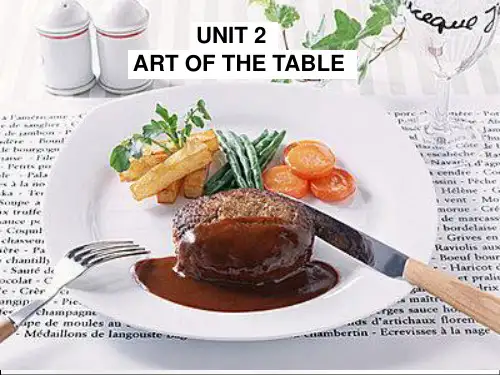

课文原文1-7 Unit 1 The Hidden Side of Happiness1 Hurricanes, house fires, cancer, whitewater rafting accidents, plane crashes, vicious attacks in dark alleyways. Nobody asks for any of it. But to their surprise, many people find that enduring such a harrowing ordeal ultimately changes them for the refrain might go something like this: "I wish it hadn't happened, but I'm a better person for it."1飓风、房屋失火、癌症、激流漂筏失事、坠机、昏暗小巷遭歹徒袭击,没人想找上这些事儿。
但出人意料的是,很多人发现遭受这样一次痛苦的磨难最终会使他们向好的方面转变。
他们可能都会这样说:“我希望这事没发生,但因为它我变得更完美了。
”2 We love to hear the stories of people who have been transformed by their tribulations, perhaps because they testify to a bona fide type of psychological truth, one that sometimes gets lost amid endless reports of disaster: There seems to be a built-in human capacity to flourish under the most difficult circumstances. Positive responses to profoundly disturbing experiences are not limited to the toughest or the fact, roughly half the people who struggle with adversity say that their lives subsequently in some ways improved.2我们都爱听人们经历苦难后发生转变的故事,可能是因为这些故事证实了一条真正的心理学上的真理,这条真理有时会湮没在无数关于灾难的报道中:在最困难的境况中,人所具有的一种内在的奋发向上的能力会进发出来。
UNIT 1 Low-Carbon Economy2. Vocabulary(1) adverse (2) stark (3) inflict (4) systematically (5) triggered(6)improvident (7) incurred (8) alternative (9) lost out on (10) settled onB C A D B C A D C D3. Cloze(1) embraced (2) sped up (3) running out (4) urgency(5) initiative (6) specific (7) designated (8) contribute(9) incorporate (10) hampering (11) reward (12) involved(13) adverse (14) adaptive (15) vulnerability (16) alternative(17) context (18) due to (19) compensation (20) scheduled4. Translationa. Chinese to English1) Translate the following sentences into English.(1) Bending under the weight of the packs, sweating, they climbed steadily in the pine forest that covered the mountainside.(2) Concentrating on time passing, as we do when bored, will trigger brain activity which will make it seem as though the clock is ticking more slowly.(3) Unemployment shot up in France during the second quarter, and the country’s top finance official said the situation will continue to aggravate even if a global economic recovery gathers pace. It was the worst quarterly unemployment in France since early 2006.(4) As social practice continues to develop, we should keep renewing our ideas and make innovations courageously in light of practical needs.(5) Bicycles are regarded as an economical alternative to buses whose fares have increased 3 times in the past few years.(6) The U.S. government has called on people to save water because the scarcity of water has become a source of global tension ecologically, economically and politically.(7) In order to be a recognized leader in the industry, it’s essential for a company to improve production quality and tap the overseas market through the help of state-of-the-art technologies and equipment.(8) If you are thinking about coming to Britain for Christmas, it might be a good idea to think again. That’s because thousands of Christmas travelers have been stranded in the UK as adverse weather conditions caused massive disruption to the transport infrastructure.2) Translate the following paragraphs into English.Scientists say the warming of the planet will be gradual, but that extreme weather events will increase in frequency and intensity. They say the effects of more storms, floods, droughts and heat waves will be abrupt and profound. The World Health Organization says the effects of so-called climate-sensitive diseases already are killing millions of people.Climate change is a global phenomenon. While no country will be exempt, she says its consequences will not be evenly distributed. The WHO chief says poor countries that already are struggling with huge problems will be most affected. Fragile health systems in the developing world will come under increased stress. They will have great difficulty coping with the increased burden of disease and other health problems.b. English to Chinese1) Translate the following paragraph into Chinese.很多权威的气候学家们都曾发出过这样的警告: 如果我们现在的温度超过工业化前2摄氏度(3.6华氏度)的话,我们将会迈进一个危险的未知国度。
《研究生英语综合教程上》1-6单元练习参考答案Unit OnePlanning Your Future CareerReading Focus Traits of the Key PlayersText ExplorationTask 2 1. B 2. A 3. D4. B5. D6. B7. C8. B9. B 10. BVocabulary in ActionTask 1 1. A 2. C 3. B4. C5. D6. D7. D8. C9. A 10. D 11. A 12. BTask 2 1. public <c> 2. discipline <b>3. strength <a>4. reference<a>5. strength <d>6. public <a>7. demonstrated <b> 8. discipline<c>9. reference <c> 10. personality<a>11. disciplining <d> 12. demonstrates <a> 13. public <d> 14. reference <b>15. personality <c>Task 3 1. employment 2. paid3. adjust4. setting5. discouraged6. credit7. cite 8. demonstrate 9. teamwork10. rulesTranslation PracticeParagraph One"一年365天,一周7天,一天24小时,生意始终在进行。
这意味着一年365天,一周7天,一天24小时,竞争也同样在进行。
"豪特说,"公司取胜的方法之一,就是要更快到达‘目的地’!这就是说,你不仅要把所有能支持公司快速运转的功能都调动起来,而且还得知道如何决定‘目的地’是哪里。